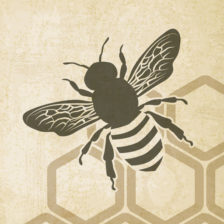New popularity of beekeeping has produced a number of interesting models for folks to take advantage of in managing honey bees. These are especially true in the modern urban scene: There are several associated with hotels like Philadelphia, recently reported by National Public Radio: “Don Shump manages four hives of honey bees on the roof of the Sofitel hotel – 14 floors up from the street – in downtown Philadelphia. “Usually people go, ‘You’re doing what on the roof in Philadelphia and how high?’ And the conversation goes from there,” he said. Shump started the Philadelphia Bee Company in 2011, and now handles about 65 beehives in 15 locations around the city. ” ‘Being able to keep bees in an urban setting allows us to take advantage of the blight we have downtown. We have 40,000 abandoned lots in the city,’ Shump said. ‘Bees really love the weeds that we have. Philadelphia in particular has a couple hundred years of botanical awesomeness going on.’ ”
Several cities have recently permitted beekeeping, whereas before the activity was banned. New York City has a training program, there are bees kept at the Waldorf Astoria Hotel, and Brooklyn provides classes and other instruction at its botanical garden. Los Angeles has legalized beekeeping, and sponsored the First Annual “Natural Beekeeping Conference” in Pasadena. Other similar initiatives exist as well according to Wikipedia.com, including a new initiative in Canada. In London, Urban Bees was set up about a decade ago to install and maintains hives in the capital. It also runs courses teaching people about bees and helps to engage people in making cities more bee-friendly.
There are downsides to urban beekeeping, including lack of forage in some cases. Honey bees prefer rural landscapes in favor of urban in some cases, revealing that a mix of plants may not be a panacea. In a pinch, honey bees will collect almost anything, which can lead to collecting contaminated nectar and pollen. Substitutes for the latter in rural areas have included anything of similar size, including any possible micro-encapsulated product, notoriously a material known as Penncap M®.
Noah Rich manages honey bees in several major cities for clients. See his opinion in LA Times lobbying to make beekeeping legal; illegal since 1879. See his Ted Talk on why every city needs healthy bees. 12:35 minutes, published June 2012. Membership in beepods.com $50/year phone support. Members and non members can ask for quotes. In Montreal, Canada an outfit called Alvéole also provides for installation of bee hives and their management among other services.
Toni Burnham, a columnist for Bee Culture Magazine, writes monthly on urban beekeeping. She suspended her blog in 2012. Take a look at the Cooperative Extension Service in your area; no doubt there will be training opportunities there as well now and in the future.

